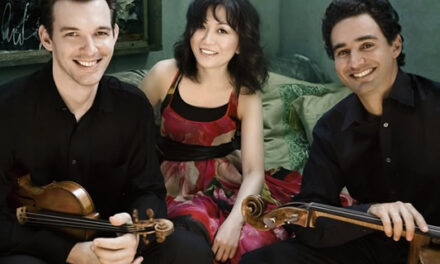The ECU Chamber Singers get all the ink, and deservedly so, but they aren’t the only choral music game in town. East Carolina University’s “other” choral ensembles – the Men’s Choir and the Women’s Choir – showed during a concert of mainly contemporary compositions at First Presbyterian Church that they, too, merit attention.
The Men’s Choir, conducted by Dr. James Franklin, director of choral activities in the ECU School of Music, is an ensemble of about 35 voices, and the Women’s Choir, conducted by Dr. Jami Rhodes, consists of nearly 50 voices. Many, if not most of the singers in these ensembles, are not music majors but participate primarily for the joy of singing. (One might make a comparison to a university’s club-level intercollegiate sports teams – players good enough or almost good enough to make varsity but not wanting the full set of demands and rigors of varsity training and competition.)
The selections for the early March concert covered quite a lot of territory, much of it not likely very familiar to the general listener, from traditional American folk music to Estonian music to South African music to American spirituals. The Men’s Choir opened with Philip Silvey’s arrangement of the American folk song “Nine Hundred Miles” and delivered a clean and clear sound with precise enunciation. After a dramatic, emphatic reading of Z. Randall Stroope’s “Dies Irae,” the young men softened the tone a bit for Scott Farthing’s “Come Travel With Me” (directed by student David Mosely) and then provided the most interesting piece of their set, “Deus, protégé a bello,” by Estonian composer Veljo Tormis.
Based more on a drone than a chant, this piece, a musical plea for protection against war, begins with a bass foundation, joined by tenors, and often builds on long sustained notes mostly in unison and mostly at the bass level. One would be hard pressed to call this melody, at least in the traditional sense, but it was quite an interesting musical sound, with some close harmonies and sections of rising intensity.
The set closed with the rousing spiritual, “He Never Failed Me Yet” by Robert Ray. Bass soloist Nelson Pardo and tenor soloist Jordan Roberts added nice touches, especially Roberts’ expansive vocal lines. The close harmonies in the tenor section were quite good.
As good as the young men were, the young women were simply splendid, singing without scores from start to finish. They opened with a lovely “Travelin’ Home,” as arranged by Andrea Ramsey, while standing in a large arc around the sanctuary. Accompanied nicely by violinist Michelle Guthrie, the singers opened with a beautiful unison sound before expanding into parts. After the unison opening, the harmonies were luscious and beautifully presented; the diction was excellent; the entrances and cutoffs were precise.
Two highlights of the set were “Dubula,” a South African (Xhosa) folk song arranged by Stephen Hatfield, and “Criome Mi Madre,” a Spanish lullaby by Francisco J. Nunez. On the former, sung in the language, the women opened with a mellow sound and moved into a highly spirited main section and included some nice hummed chords. Paul Baker provided good drumming accompaniment. On the latter, directed by student Kimberly Ness and accompanied by guitarist Kate Oliphant, the women conveyed a sense of wistfulness for a different life from that of a basket maker.
The choir closed with Craig Hella Johnson’s “Will There Really Be a ‘Morning’?” and Gerald T. Smith’s rousing setting of Psalm 118, “This Is the Day.” In these pieces, as in the entire set, one was struck by the unified sound of all voices, without noticeable vibrato, along with the lively conducting style of Rhodes, who seemed to connect well with each singer and section.
This was an hour well spent, with fine choral singing of music from different cultures, most of it somewhat apart from the mainstream of the choral repertoire. Kudos to the young singers and to directors Franklin and Rhodes.












